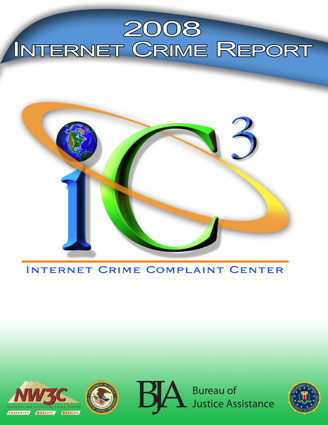The Federal Bureau of Investigation (FBI) and the Internet Crime Complaint Center (IC3) issued their Annual Report a few months ago. Among the highlights is that auction fraud – a frequent topic in the hobby of collecting original television and movie props and wardrobe – was reported to make up one of four complaints made to the organization.
The summary headline archive for the report can be found at FBI.gov:
The full annual report (in PDF form) can be found via the link below:
Below is the summary overview of the IC3 from the report:
The Internet Crime Complaint Center (IC3), which began operation on May 8, 2000, as the Internet Fraud Complaint Center was established as a partnership between the National White Collar Crime Center (NW3C) and the Federal Bureau of Investigation (FBI) to serve as a vehicle to receive, process, and refer criminal complaints regarding the rapidly expanding arena of cyber crime. IC3 was intended for and continues to serve the broader law enforcement community, including federal, state, and local agencies, which employ key participants in the growing number of Cyber Crime Task Forces. Since its inception, IC3 has received complaints across a wide variety of cyber crime matters, including online fraud (in its many forms), intellectual property rights matters, computer intrusions (hacking), economic espionage (theft of trade secrets), child pornography, international money laundering, identity theft, and a growing list of additional criminal matters.
IC3 gives the victims of cyber crime a convenient and easy-to-use reporting mechanism that alerts authorities of suspected criminal or civil violations. For law enforcement and regulatory agencies at the federal, state, and local levels, IC3 provides a central referral mechanism for complaints involving Internet related crimes. Significant and supplemental to partnering with law enforcement and regulatory agencies, it will remain a priority objective of IC3 to establish effective alliances with industry. Such alliances will enable IC3 to leverage both intelligence and subject matter expert resources, pivotal in identifying and crafting an aggressive, proactive approach to combating cyber crime. In 2008 the IC3 saw an increase in several additional crimes that are exclusively related to the Internet, which include phishing, spoofing, and spam complaints, and have increased over the past year.
Overall, the “IC3 2008 Internet Crime Report” is the eighth annual compilation of information on complaints received and referred by IC3 to law enforcement or regulatory agencies for appropriate action. The results provide an examination of key characteristics of 1) complaints, 2) perpetrators, 3) complainants, 4) interaction between perpetrators and complainants, and 5) success stories involving complaints referred by IC3. The results in this report are intended to enhance our general knowledge about the scope and prevalence of Internet crime in the United States. This report does not represent all victims of Internet crime, or fraud in general, because it is derived solely from the people who filed a report with IC3.
Of the cases from 2008 cited in the report, the one I found most interesting is that of a woman in Virginia who defrauded sports memorabilia collectors out of $3,000 by selling misrepresented pieces via auction on eBay. She was sentenced to four years in prison. This is remarkable, given the relatively low monetary loss, in that I am aware of many individuals and companies who have each sold hundreds of thousands of dollars worth of fraudulent entertainment memorabilia on eBay and elsewhere with no consequences in the justice system. However, in my own recent discussions with law enforcement, the FBI in particular, there does seem to be more interest in pursuing such cases than in the past.
In reading the report, it is apparent that many complaints are based on fraud perpetrated using eBay. It is my opinion that the current state of the “Original” Entertainment Memorabilia categories in particular are rife with fraud, to the point where I would advise new, novice, and casual collectors to not use the service for obtaining such collectibles unless it is being sold directly by a reputable studio reseller. Outside of those narrow parameters, my advice is to always seek counsel and advise from other collectors, in that there is substantial risk of being defrauded in buying original television and movie props and wardrobe.
Also of interest is that in 2008, though there was a significant 33% increase in the number of cases reported to the IC3; still, one in four (72,940 of 275,284 in total) were referred to local, state, and federal law enforcement for further investigation.
The report includes links to a number of useful resources for citizens that have been defrauded or encountered other issues via the Internet for which involvement of law enforcement may be productive.
- The National Consumers League – National Fraud Center “Online Incident Report Form”: www.fraud.org
- The Internet Crime Complaint Center “File A Complaint”: www.ic3.gov
- The Federal Trade Commission “Complaint Assistant”: www.ftc.gov
- eBay Online Fraud Complaint Reporting Forum: www.eBay.com
Jason DeBord



